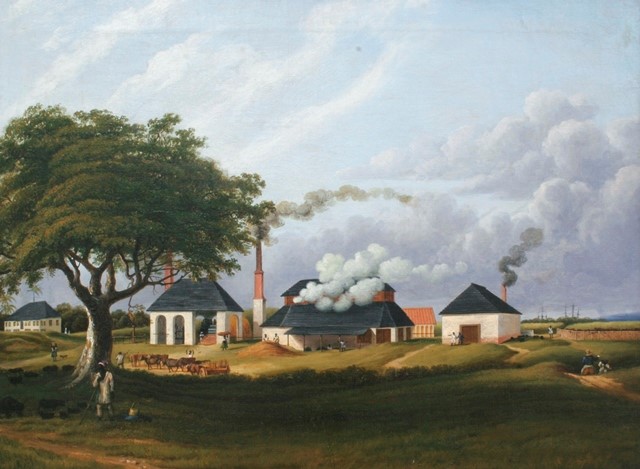#CANCELLED# Plantation Islands? Landscape Design in Eighteenth-century Ireland, Jamaica and San Domingue

Thursday 11 June 2020, 6.00PM
Speaker(s): Finola O’Kane (University College Dublin)
#CANCELLED#
Plantation design was translated from Ireland to the more distant colonies of the British empire over the course of the long eighteenth century. The Browne family of Westport, Co. Mayo, designed and managed their Jamaican plantations as absentee landlords, drawing on the skills and expertise of key employees such as George Hildebrand, land steward and agent for the Mayo estates and Alexander Bravo, manager of the Jamaican estates. They carried out many of the Brownes’ plans for improving their estates at home and abroad, while also enriching themselves. Hildebrand’s drawings of both the Irish and Jamaican estates conflated the representation of two very different places into one seamless tradition.
A drawing could represent a complex, messy, real place as an ideal, abstract and transnational space. The seemingly inevitable logic and inordinate success of plantation design, with its overtones both of the landed estate and the factory, derived from this ability to abstract a place into a space. This paper will triangulate between the landscapes of Ireland, Jamaica and San Domingue to explore how European landscape design was translated into Caribbean plantations during the long eighteenth century. It will explore the use of drawing as a key method of communication between landlords and agents, Europe and the Americas.
Free Registration via Eventbrite
Professor Finola O’Kane researches the designed landscape history of Ireland and of the Atlantic world, with a particular interest in the cultural, philosophical and aesthetic dimensions of this history. Her first book Landscape Design in Eighteenth-Century Ireland was awarded the inaugural J.B. Jackson Book Prize by The Foundation for Landscape Studies, New York in 2007. Ireland and the Picturesque; Design, Landscape Painting and Tourism in Ireland 1700-1830 (2013, Yale University Press on behalf of the Paul Mellon Centre for Studies in British Art) was also awarded a 2016 J.B. Jackson Book Prize, and also received an Elisabeth Blair McDougall Honorable Mention book award from the Society of Architectural Historians (US) in 2016. She published William Ashford's Mount Merrion; The Absent Point of View, a book on the evolution and representation of Dublin's Fitzwilliam estate, in 2012. In the field of conservation she has jointly edited two books with Gillian O'Brien- Georgian Dublin in 2008 and Portrait of The City; Dublin and the Wider World in 2012, the latter as part of the UCD-OPW Framework for Cultural Significance funded research project. In 2013 a Dumbarton Oaks (Harvard) fellowship led her to embark on her current book project Landscape and Revolution; Ireland, France and America 1770-1810.
The Annual Stephen Copley Lecture is in commemoration of Stephen Copley, one of the Centre's founding members. Professor Copley was responsible for pioneering research in the field of the eighteenth-century picturesque landscape and Professor O’Kane’s work, which operates at the intersection of archaeology, art history, history of architecture, history, and literary studies, builds on this legacy and his commitment to interdisciplinary research. Her lecture will have a broad appeal for those interested in eighteenth-century landscapes, as well as those interested in the Age of Atlantic Revolutions.
Location: King's Manor, K/133
Admission: Ticketed event. All Welcome
Email: cecs1@york.ac.uk
